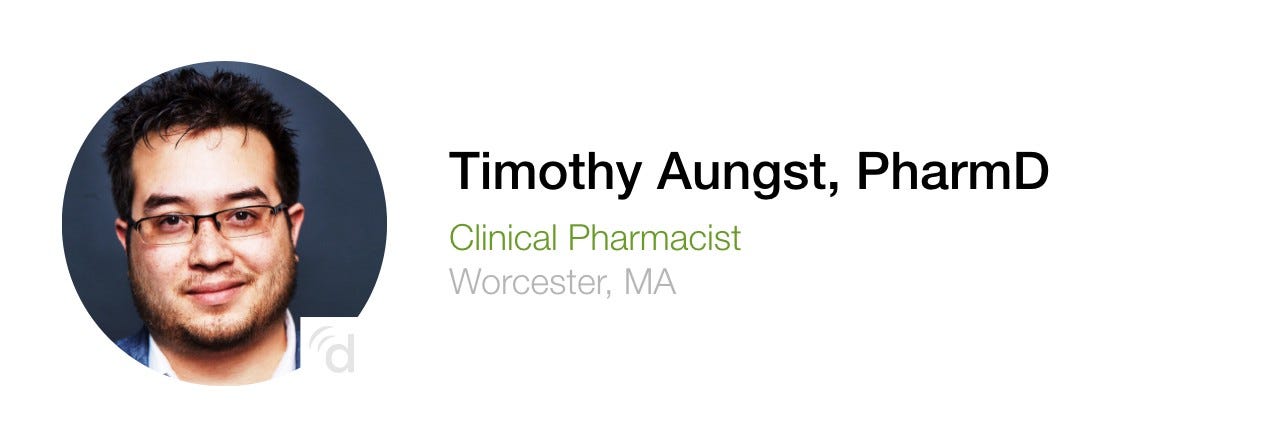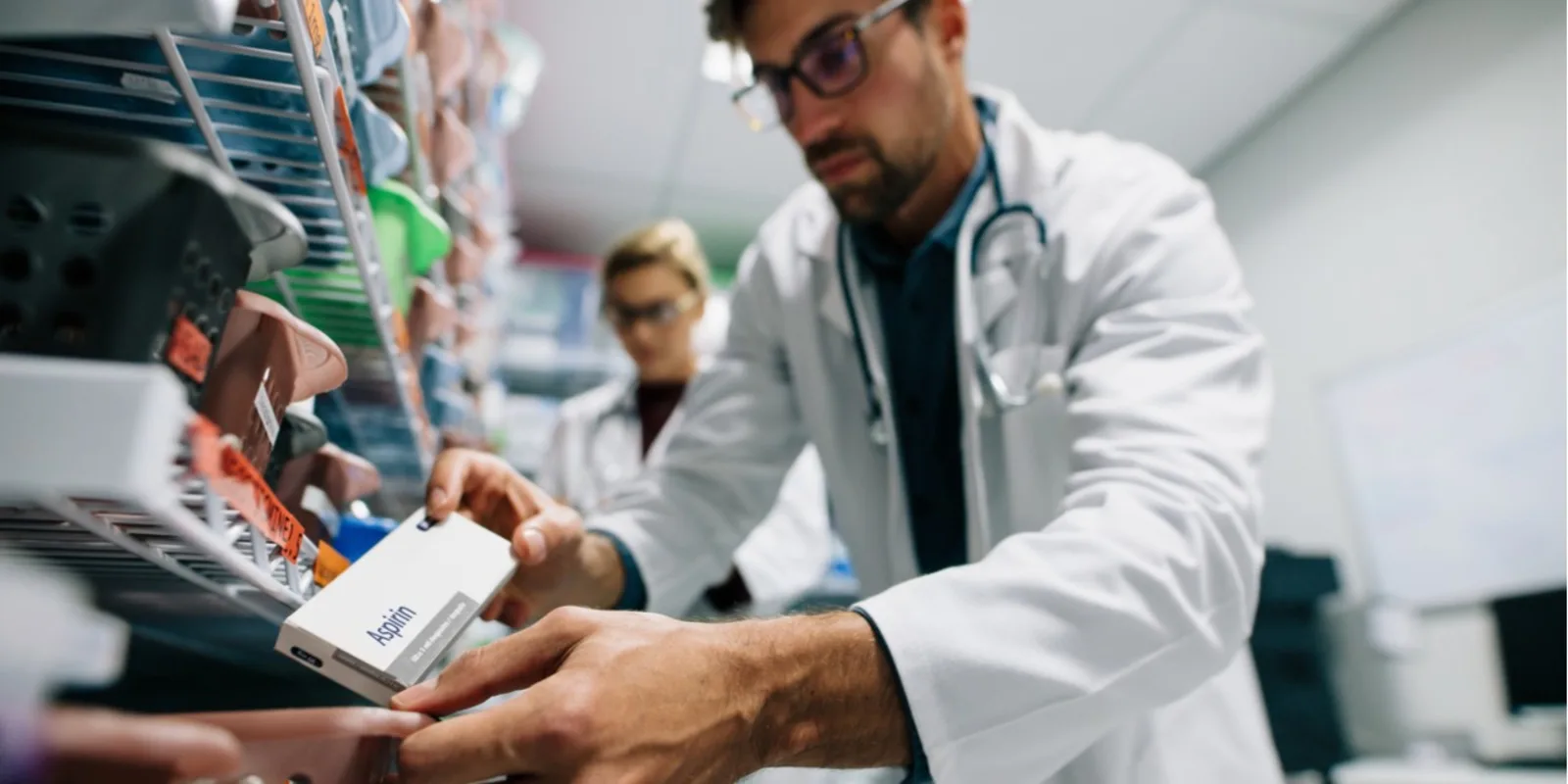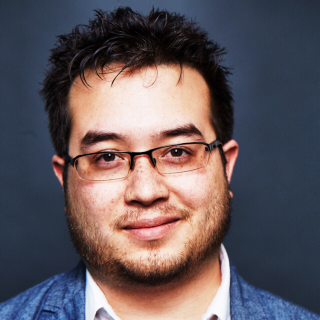
I get it. Technology is increasingly becoming a facet of our lives that we cannot escape. Questions such as ‘How do we Uber this…’ or ‘Make the next Keurig of that…’ or ‘How can we just automate it’ are boundless. For me, the role of the smartphone — and increasingly tethered devices and equipment — are fascinating, and its implication to healthcare at large is daunting. For the profession of pharmacy though, I think we are seeing a slow progression of adoption of new advances coupled with outside groups (e.g., start-ups) that want to disrupt how we get drugs to people. But that’s the thing, is a pharmacist only valued for their ability to dispense medications? That is something even the pharmacy profession as a whole is grappling with, and there are huge potentials there as well.
I spend a lot of my time writing and pondering the implication of technology on the pharmacy profession, and most of my publications and speaking roles have focused on it, including my latest talk at this past ASHP Midyear on Apps for Inpatient Pharmacists. While at the conference, I spent a lot of time talking with some colleagues about where technology could impact pharmacy in the future, and we did some thought experiments on what it would take to get rid of pharmacists overall. One thing that has always struck me as interesting is that in almost all the sci-fi books and movies I have watched, there are no pharmacists. Is that an inevitability?
So let’s start with a historical look before I launch into my thoughts on what pharmacy faces today. Pharmacists in the U.S. have seen the profession as whole change substantially since its inception, especially in the past 60 years. For one, the name has changed a lot, whether it be ‘apothecary’ or ‘druggist/chemist’ or ‘pharmacist’ in the 1970’s. So what changed with all of those titles and roles over time?
For one, the profession transformed from a manual job based on compounding drugs to one more focused on the clinical aspect of dispensing already prepared medications. I would argue that most pharmacists (outside of a hospital or compounding pharmacy setting) rarely do compounding a few times a week. The reason for this is two-fold. One is the legal implications set about by the FDA in the beginning to mid-20th century, which mandated that drugs needed to demonstrate safety and efficacy. This got rid of a lot of the snake oil being made and sold. This, in turn, led to the explosion of the pharmaceutical industry and the launch of clinical trials to create medications at set doses and preparations to be sold. So, pharmacists, instead of spending all day just trying to create batches of medications based on ingredients thought to work, turned into a profession that was responsible for the management of a purchased inventory that was then sold to patients. Taking this into consideration, with drugs now being created and packaged to be counted out to patients, why did the education level of pharmacists also drastically increase? I mean, to be a druggist a century ago you could be an apprentice, for instance, and not even need a college education. But instead, with the drastic changes in the understanding of how medications work in the body, we saw an increased responsibility for the profession to have a better scientific knowledge. This led to pharmacists’ education being formalized as a 3-year program (after undergraduate education) up until the 80s/90s. Then, there was a movement to have pharmacists have a more-formal clinical knowledge of diseases and their management, which led to the expansion of the degree to an optional 4-year program for a doctorate, which was then made mandatory for all education requirements in 2000. And yet, I find it fascinating that people still think I have a Ph.D. in pharmacology. I don’t; I’m not a scientist. The current newly minted pharmacist of the 21st century holds a Doctorate of Pharmacy (PharmD) which is a focus on both an understanding of pharmacology and pharmacotherapeutics. The expectation of a current pharmacist is that they can not only dispense medications, like their forebears, but also provide clinical input and recommendations into the best course of therapy for a patients management. So, while on the one hand, the profession has kept to its routes being tied closely to drug dispensing, its scientific and clinical knowledge have drastically increased in the past 30 years.
Nonetheless, the application of that clinical knowledge has been slow to spread and be utilized, and that brings me to the issue of technology and its vast disruption focused on the pharmacy field at large today. Approximately 70–80% of the pharmacy workforce is still dedicated to the review of prescriptions and dispensing of medications. The remainder consists of pharmacists in clinical duties, management, industry, academia, and other sub-roles. With the majority of pharmacists still tied directly to dispensing medications, the fear of automation replacing such roles is, in all honesty, rather scary.
Recent news of Amazon wanting to get into the pharmacy business caused a lot of consternation for pharmacists I knew, and thoughts on what it could mean for jobs. After all, Amazon is known for their great use of technology to overcome logistical issues to get consumers a product in days, or even the same day. Could the dispensing of medications be usurped rather quickly? No, at least not right away, I think. For one, even if automation would make the ‘counting’ of medications faster, you still need a pharmacist to check the medication. It’s the law.
But laws and regulations to protect the sanctimonious role of pharmacists as the gatekeepers of getting medications to patientscan’t be safeguarded forever. We see in the news even medical professions seeking to understand what innovations can either undermine or replace current roles, such as in the case of radiology where there are thoughts that AI or data analytics could replace a lot of the work done there. Could the same be done in pharmacy, where systems are created that can check that a prescription is correct (especially with the movement to digital/e-prescriptions), that there are no significant issues (drug interactions, disease interactions, accurate dosing, and therapeutic uses), billing is handled with no hiccups, and that a patient could just buy a medication from a machine with no concerns? I would say possibly. Talking with a few colleagues at the Midyear, many think that 80–90% of what a pharmacist does could be automated in the coming decades, depending on how fast technology advances. So, what is a pharmacist to do, or rather, what will pharmacist be doing in 20–40 years? What if some companies seek to lobby to undo the current laws and regulations currently in place by arguing that technology is more accurate and faster than a pharmacist in this capacity?
Where once pharmacies thought they were innovative by offering a drive-through for patients to drop off and pick up their meds, the expectation is why can’t they deliver it? Where once patients had to wait to see a provider in a clinic for a mild issue, they can now go online for a telemedicine service and get a medication mailed out to them in the next day without seeing a pharmacist. Where once a patient might ask a pharmacist about their medication and possible interactions, they now turn to Google. These developments are primarily coming from outside of traditional pharmacy organizations and businesses. Start-ups and related ventures see a brick-and-mortar operation and want to find a way to ‘disrupt’ it based on a supposition of what it does. I wouldn’t say they are necessarily wrong if they feel that changing the supply chain of medications is the primary objective as it still is the ‘bread-and-butter’ of the profession and most pharmacies profit area, but I think it’s only the beginning.
The pharmacy profession needs to change. I won’t be the first or the last to say it. Current companies need to adapt, to keep apace. CVS and Walgreens have invested into the digital health space, but little have I seen involve direct pharmacist duties, and more or less to enhance the customer experience. You could argue that the potential CVS & Aetna merger is a strategy to also keep pace with these developments by shutting out competitors and locking in patients to a closed network. I would hope that services would then be launched to facilitate the use of pharmacists for further clinical services, because I feel that is one of the only realms currently open to keep the profession viable in the long-term, at least for the vast majority of practicing pharmacists who work in the community (i.e., retail) setting. Based on conversations with others, I do not see the hospital being hit too fast and will be more likely the setting to be the lowest risk for the time being, just based on current operations.
Community pharmacists will need to transform beyond medication dispensing roles. It’s a plan that has been in action for over a decade. The rollout of Medication Therapy Management (MTM) services was aimed to provide a billable service that pharmacists could perform. Its uptake, however, has been lackluster. The issue with pharmacists is that while they have clinical knowledge and medication expertise, there is practically no way to profit off of it. So, in pursuit of a mid-level practitioner role, pharmacists will inevitably lose out. Providing flu shots won’t be enough. So what else?
It’s for that reason, that while technology proves to be a potentially high threat to most pharmacists, I also see it as a way to perhaps find new ways to integrate pharmacists into the more extensive health space. I think finding billable paths is needed and, whether it’s through telemedicine or other clinical services, should be explored. I have not come across many pharmacist ‘disrupters’ looking to change things beyond just dispensing medications to patients, and this is an untapped area rapt for change. I blame the profession as well for not anticipating potential changes coming shortly, and for potentially locking ourselves in a potentially changing dynamic in healthcare that other professions are taking notice. The issue I feel also comes down to the fragmentary nature of the profession.
You see, pharmacy has no central voice. We have multiple organizations and societies, but none that singularly can speak for the profession at large and lobby for us. We are also seeing a growing disparity between roles of pharmacists, with those working in dispensing roles versus those focused on clinical duties. California for instance just launched a new realm for pharmacists, creating ‘Advanced Pharmacist Practitioners’ who can prescribe, order tests, and provide other clinical services that are obviously billable. But this will only include a small subset of pharmacists. One area that may lead a more substantial role for community pharmacists is the ability to dispense certain classes of medications. For instance, we are seeing some states allowing pharmacists to dispense birth control. This is one small step, but a case in point to perhaps move on to other therapies.
We will need to encourage current and future pharmacists to think beyond dispensing medications. We will need to think beyond just being drug information experts. Both will be substantially changed with the advent of new tech such as AI and analytics. I do not know the answer, but I feel that, overall, much needs to be thought about to spur development and to encourage collaboration across all pharmacy groups to rethink what pharmacists can do, how to leverage technology to be an asset, and how to stay viable in the future.

Timothy Aungst, PharmD, is an Assistant Professor of Pharmacy Practice at MCPHS University and a clinical pharmacist in outpatient heart failure management at UMass Memorial Medical Center, Worcester, MA. His interests include the intercession of technology and healthcare, with primary focus on mobile health (mHealth) and Digital Health. He blogs regularly at thedigitalapothecary.com and you can find him on Twitter @TDAungst. He is also a 2017–2018 Doximity Fellow.






